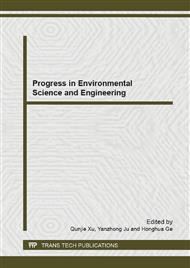[1]
MH/T 6020. Quality Control of Civil Aviation Fuel and Operational Procedures[S](In Chinese).
Google Scholar
[2]
MH 6005. General Rules for Safety of Aircraft Fuelling [S] (In Chinese).
Google Scholar
[3]
X.G.Wu, Y.Z. Han, J. Li, et al: Research Advances inTtreatment of Oily Wastewater [J]. Environment Science and Technology, 2010, 23(2): 64-67.
Google Scholar
[4]
C. Vega, M. Delgado: Treatment of Waste Water/Oil emulsions Using Microwave Radiation[R]. SPE 74164, 2002.
DOI: 10.2118/74167-ms
Google Scholar
[5]
J.C. Wang, D.M. Xue, X.Quan, et al: Research on treating repositive brilliant blue KN-R Solution by Microwave Radiation[J]. Acta Scientiae Circumstantiae, 2001, 21(5):628-630.
Google Scholar
[6]
D.A Jones, T.P Lelyveld, S.D Mavrofidis, et al: Microwave Heating Application in Environmental Engineering-areview[J].Resources,Conservation and Recycling, 2002, 34:75-90.
DOI: 10.1016/s0921-3449(01)00088-x
Google Scholar
[7]
J.M.Al-Hassan, M.Afzal, C.V.N. Rao: Petroleum hydrocarbon pollution in Sharks in the Arabian Gulf[J] .Bull. Environ. Contam.Toxicol, 2000, 65:391-398
DOI: 10.1007/s0012800140
Google Scholar
[8]
Y.Wang, H.T. Sun, B.H. Wang, et al: the Influence of the Thermal Effect and the Non-thermal Effect of microwaves [J]. Liaoning Chemical Industry, 2006, 35(3): 167-169.
Google Scholar
[9]
Asher Shazman, Shimon Mizrahi, Uri Cogan, et al: Examining for Possible non-thermal Effects during Heating in a Microwave Oven[J]. Food Chemistry, 2007, 103: 444-453.
DOI: 10.1016/j.foodchem.2006.08.024
Google Scholar
[10]
L.X. Xia, Q. Liu, L.Zhang, et al: Advances in demulsification of emulsions under microwave radiation [J]. Chemical Research and Application, 2005(5):588-591
Google Scholar
[11]
H.P. Wang, D.S. Wang, Y.Y. Pan, et al: Experiment of Deoiling Factors on Treatment of Oil-in-water Emulsion Using Microwave Radiation[J]. Technologyof Water Treatment, 2011, 37(5):26-29.
Google Scholar
[12]
X.Y. Liu, W.H. Chu, C.L. Dai, et al: Microwave separation of oil-water emulsion [J]. Journal of Daqing Petroleum Institute, 2005, 29(3):99-101(In Chinese).
Google Scholar
[13]
P.Wang, Y.Tian, W.Zhang, et al: Emulsion Wastewater Treatment with Microwave Irradiation Technology [J]. Journal of Harbin Institute of Technology, 2007, 39(8):1233-1235(In Chinese).
Google Scholar
[14]
M.J.Li, J.Z.Li: Preparation of the Microemulsion of Diesel Fuel[J].Energy Research and Utility, 1997, (1):29-31.
Google Scholar
[15]
SY/T 0530. Determination of Oil Content in Oil Field's Waste Water - Spectrophotometry [S] (In Chinese).
Google Scholar
[16]
Y.Y.Li, C.R.Hu: Experimental Design and Data Processing[M]. Beijing: Chemical Industry Press. (2008)
Google Scholar


